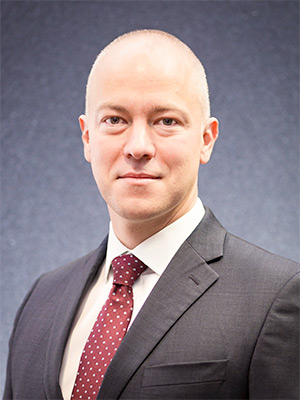
TMCC Institutional Advisory Council (IAC) Chair Elmar A. Davé, CEO of Nosscon Industries
Elmar A. Davé, Institutional Advisory Council (IAC) Chair for Truckee Meadows Community College, brings no less than an international vision to the task of guiding the IAC.
Mr. Davé took office as Chair in August. In the private sector, he is the CEO of Nosscon Industries, a contract manufacturing company for medical device technologies. From his experience managing and growing international companies, Davé perceives that TMCC is positioned to make a critical and lasting impact upon the economy of Northern Nevada.
"Especially for manufacturing companies and certain service sectors in the region, TMCC fills the incredibly important gap between the high school diploma and the traditional four-year university undergraduate degree,” he said. “Apprenticeship and certificate programs at TMCC, as well as the college's innovative support programs for high school students, open doors for graduates to meaningful and rewarding technical career paths."
Before pursuing his formal higher education at the Technische Akademie in Hamburg, Germany and New York University (NYU) Stern School of Business in New York, Davé studied the highly effective apprentice and journeyman programs in Germany, where workers experience up to three-and-a-half rigorous years of pure on-the-job practice as they establish their career.
"Though state-of-the-art manufacturing processes are highly computerized and typically require an in-depth understanding of software applications and programming languages, this practical type of workforce preparation, which has always been a strong contributor to Germany's export economy, is less developed in the United States,” Davé said. “As a matter of fact, in the states we are following a tendency to continuously reduce students' practical learning experience down to the limited tactile stimulation of a keyboard or touch-screen, rather than actual raw materials and tools. What draws me to TMCC is that the college can close this skills gap."
By building the bridge between analytical thinking and practical hands-on proficiency, TMCC is extremely well-positioned to help advance an increasingly diverse regional economy and help meet Nevada's workforce needs. Along with large companies that have built operation centers near Reno, such as Tesla, Inc. and Panasonic Corporation, there are substantial possibilities to attract additional high-impact industries to the state, including decidedly regulated medical device, pharmaceutical, aerospace and defense technologies.
"There are fantastic opportunities here," he said. "As Northern Nevada's economy is diversifying and evolving from gaming, mining and tourism to technology development and advanced manufacturing, we are crafting our new identity and have to systematically select and support those business verticals and key industries that will define this area for the next 25 years. TMCC has the edge to support these new key industries."
Current Issues in Higher Education
Topics in higher education that Mr. Davé would like to address in the coming two years are the relevance and suitability of existing and new curricular programs, the College's regional and international marketing reach, and general access to education.
"It is important for colleges to continuously examine the suitability of curricular programs to fit what the private sector needs," he said. "Modernizing and adapting programs to what our economy is asking for is a priority."
Also important is to effectively distribute the applicable and pertinent college information to the right audiences.
"We need to have opportunities and effective marketing methods to inform our target audience in Northern Nevada of the quality, value and variety of the outstanding programs that TMCC offers," Davé said.
He added that there are populations in rural areas close to the Reno-Sparks metro area to which the college may specifically reach out with support and targeted information about the possibilities at TMCC.
"Every day you can make a choice,” he said. “You can choose to continue along a familiar path, or choose to make a change and explore something new. What TMCC has to offer needs to be communicated clearly and effectively so people can make informed decisions and smart choices about their education and career paths.”
The third issue he would like to address is accessibility—providing attainable levels of access to programs for which many population groups can benefit.
Lasting Impacts
Mr. Davé's vision for TMCC is to achieve best practices in modernizing programs, to close skills gaps for workers trained for emerging industries, and to match curriculum with the industries that will develop and grow in the region during the next 25 years. One of the occupational fields for which he would like to see greater focus is quality assurance, because many industries migrating to, or developing in Nevada will experience an increasing need for professionals well trained in this field.
"We need to develop a stand-alone program for quality assurance, quality management and engineering,” he said. “Quality assurance skills are especially needed in highly regulated industries, including aerospace, automotive, defense, pharmaceuticals and medical devices. To be successful, companies considering relocating to Northern Nevada need employees highly trained in quality assurance concepts, auditing processes, and industry-specific regulatory compliance frameworks.”
Aerospace, automotive, defense, pharma and medical device fields can further diversify the state’s economy.
"The region has significant opportunities to develop a key presence with these industries—Nevada's business-friendly regulatory environment and advantageous cost of doing business adds to the many reasons for companies to move here," Davé added. "Northern Nevada can be a major player in international manufacturing, and TMCC is posed to play a significant part in helping the region realize this global role."
For more information about the Institutional Advisory Council, please contact the offices of TMCC President Karin Hilgersom, PhD, at 775-673-7025, or watch past IAC meetings on TMCC’s YouTube Channel.






